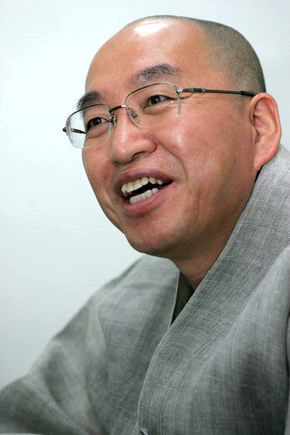 |
Civic group begins relief campaign
Join Together Society (JTS) Korea, an international relief organization combating famine, disease, and illiteracy, started a campaign on July 26 to raise funds to help North Korean flood victims. Korean Buddhist monk Ven. Pomnyun, the chairperson of JTS, said that the damage caused by recent flooding is as serious in the North as it was in 1995, the last time a major humanitarian weather disaster hit the North. He made the comments during a August 1 interview with The Hankyoreh at his JungTo Society office in Yangjae-dong, Seoul. The following is the question and answer session between Ven. Pomnyun and The Hankyoreh. Question: What's the background of the campaign to support North Korean flood victims, despite current poor public opinion of the North?Answer: I heard that about 10,000 North Koreans were dead or went missing and the number of flood victims could reach nearly 1.3-1.5 million. Under such circumstances, to not aid flood victims of North Korea would be against the founding purpose of our organization, and it also disobeys my conscience. When Indonesia was hit by an earthquake in May, JTS also held a fundraising campaign and joined the relief movement. Q: International organizations and South Korean civic groups are in a difficult situation because North Korea has not yet requested aid from them. A: We proposed giving relief to the North before receiving its request for help. We asked them what they needed with urgency, and they responded. But even if there were no reactions from North Korea, we would have provided aid. The Indian government, out of politeness, rejected our relief offer when the tsunami swept the nation in December 2004, but we went to India and did relief activities anyway. Q: It is said that the North Korean capital didn't get serious damage from torrential rains. A: Parts of Pyongyang were submerged by the waters of the Daedong River, but it did not suffer heavy casualties. Upper reaches of the river were severely hit. South and North Hwanghae provinces, Gangwon Province, South Pyeongan Province and south of Hamheung in South Hamgyeong province were hardest hit by the heavy rainfall. Some areas of South Pyeongan and Gangwon provinces were especially badly damaged. A few mountain villages located near the upper waters of the river were entirely swept away in the torrential rains, with heavy casualties. Q: How serious do you think the food shortage is from the flooding in North Korea? A: Last year, North Korea had the best harvest in a few years. Nevertheless, the communist state ran out of food in May and it stopped food rationing for dependent family members without a job, even in Pyongyang. Usually, the price of rice and corn continues to rise until the end of September and then declines 30-40 percent in the middle of October. Due to flooding, however, the North will have to suffer a serious food shortage, which will especially be worse in February next year, so without outside aid, there may be a crisis of mass starvation and massive amounts of refugees again. Q: There also are many flood victims in the South, as well. A: We should help those people whose situations are worse than ours. Needy people rarely request help, because their behavior may be considered as begging.






